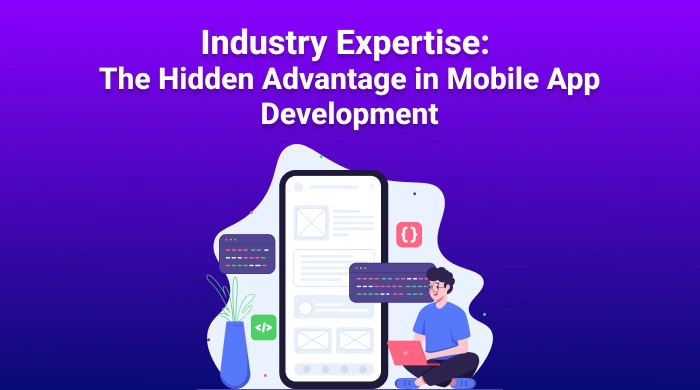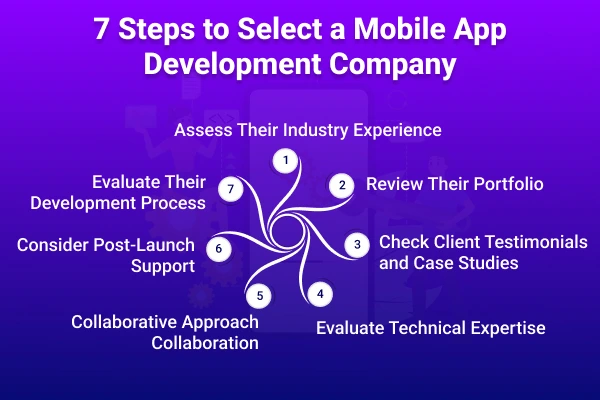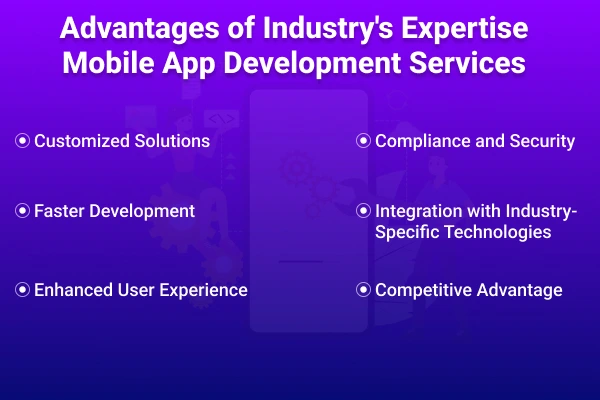
Industry Expertise: Hidden Advantages of Mobile App in Business
As we know, mobile app development has become a cornerstone for business growth and customer engagement. With over 6.3 billion smartphone users worldwide, businesses across industries are striving to create mobile applications that not only meet user expectations but also offer a competitive edge.
However, the success of a mobile application is not solely dependent on cutting-edge technology or innovative design. One often overlooked yet critical factor is industry expertise. This hidden advantage can significantly influence the outcome of mobile app development projects, leading to more targeted, efficient, and impactful solutions.
Understanding the importance of industry expertise and how it unlocks the secret advantages of mobile apps in business can further guide this approach.
Understanding the Importance of Industry Expertise in App Development
Industry expertise denotes a comprehensive understanding and insight into a particular sector, encompassing its market dynamics, consumer behavior, regulatory frameworks, and competitive environment. In the realm of mobile app development services, this implies that developers and their teams have specialized knowledge pertinent to the industry for which the application is being developed.
Such expertise empowers them to devise customized solutions that meet industry-specific requirements, compliance standards, and user expectations, thereby enhancing the advantages of mobile app development for businesses.
The advantages of mobile apps are increasingly becoming evident as more companies recognize the potential of these digital tools in their growth strategies. From increasing customer engagement to improving operational efficiency, mobile apps are transforming how businesses operate and connect with their customers.
How Industry Expertise Unlock the Advantages of Mobile Apps in Business?
Here's a breakdown of how industry expertise impacts mobile app development, leading to greater advantages of mobile apps in business:
Customized Solutions
Each industry comes with unique challenges and requirements. In the healthcare sector, software must adhere to regulations such as HIPAA, whereas a retail application prioritizes user experience and smooth payment integration.
Companies with specialized industry knowledge recognize these particular needs and develop tailored solutions, ensuring that the application harnesses the advantages of mobile technology in business by conforming to the best practices of the respective sector.
Faster Development
Firms with industry experience have in-depth expertise in sector-specific challenges and best practices. It shortens the learning curve, minimizing time spent on research and problem-solving.
As a result, development cycles are faster, allowing businesses to launch their apps quickly and seize market opportunities ahead of competitors. Faster time-to-market can be crucial in dynamic industries where the benefits of mobile apps can significantly improve market share and profitability.
Enhanced User Experience
Comprehending the preferences, behaviors, and challenges of the target audience is essential for creating user-friendly applications. Experts with industry knowledge can craft intuitive user interfaces and seamless navigation that align with user expectations. Leveraging the benefits of mobile applications over websites, including enhanced customer loyalty and better retention rates.
Compliance and Security
Industries like healthcare, finance, and legal face strict regulatory requirements. Developers with industry-specific knowledge are well-versed in these legal frameworks and incorporate necessary compliance measures from the ground up. They implement robust data security protocols to protect sensitive information, ensuring the benefits of mobile apps for businesses are achieved without the risk of legal penalties.
Integration with Industry-Specific Technologies
Many industries rely on specialized technologies for higher operational efficiency. For instance, logistics businesses depend on GPS and fleet management systems, while fintech companies need secure payment gateways and blockchain integration.
Organizations with industry expertise can seamlessly integrate these technologies into software, enhancing functionality, performance, and scalability — driving numerous benefits of mobile apps in business.
Competitive Advantage
An industry-specific mobile app provides a significant edge over competitors by addressing unique business needs. Customized features, better functionality, and a seamless user experience help businesses stand out in crowded markets.
This differentiation grabs the attention of more customers, improves brand loyalty, and stands out your company in a competitive market, showcasing the several benefits of mobile app development of mobile apps for business.
Examples of Industry-Expertise in Mobile App Development
Here are some examples of how industry knowledge revolutionizes app development across various sectors, all showcasing the advantages of mobile apps in business:
Healthcare
Healthcare developers with expertise in medical regulations create apps that adhere to HIPAA (Health Insurance Portability and Accountability Act) standards, ensuring that patient data is secure and private. The benefits of mobile apps in the healthcare industry include enhanced patient management and streamlined communication between doctors and patients.
Finance
FinTech apps need to meet strict security and regulatory requirements. Development teams familiar with regulations such as PCI-DSS (Payment Card Industry Data Security Standard) or GDPR (General Data Protection Regulation) can build apps that ensure secure transactions and data protection. It unlocks major benefits of mobile apps in finance, such as enhanced customer trust and faster payment processing.
eCommerce
eCommerce industry expertise enables developers to create intuitive apps that provide a smooth, seamless shopping experience. The benefits of mobile apps in eCommerce include streamlined checkout processes, personalized recommendations, and secure payment gateways, leading to increased sales and customer satisfaction.
Travel and Hospitality
Travel apps like Airbnb and Expedia offer specialized services depending on deep industry expertise. The benefits of mobile apps in travel and hospitality are enhanced customer service, better booking management, and increased customer experience.
Education
EdTech apps like Duolingo integrate key features such as interactive lessons, gamification, and personalized learning paths. The benefits of mobile apps in education are better user engagement, higher accessibility, and great learning outcomes.
Logistics and Transportation
Logistics and transportation apps, like Uber or DHL Express, require a high level of expertise in supply chain management, route optimization, and real-time tracking. The benefits of mobile apps in the logistics and transport sector include minimized delivery times, enhanced operational efficiency, and customer satisfaction.
How to Choose a Mobile App Development Partner with Industry Expertise?
Selecting the right mobile app development partner is essential for the success of your project. Whether you’re creating an enterprise app or a consumer-facing product, a partner with the right industry expertise can provide the advantages of a mobile app for your business, as mentioned above.
Here are seven steps you need to follow before making any decision:

1. Assess Their Industry Experience
Before choosing a mobile app development company, you need to check their experience in your industry. Also, ensure they have a deeper understanding of your target audience, competitors and industry-specific challenges.
For instance, if you are building a medical app, a partner with prior experience in the healthcare sector will be familiar with HIPAA compliance, security measures, and the user experience.
2. Review Their Portfolio
A strong portfolio demonstrates the expertise and capabilities of a development partner. Review their past projects to see if they’ve worked on apps that are similar to yours in terms of functionality, platform (iOS/Android), and complexity.
Pay attention to the user interface (UI) design, user experience (UX), and overall performance of the apps they’ve developed. A well-curated portfolio can provide insight into their design and technical proficiency.
3. Check Client Testimonials and Case Studies
When it comes to finding the right partner for getting advantages of mobile apps in business, client testimonials and case studies play a vital role. It helps to determine the satisfaction of previous clients and the company’s overall performance. Look for feedback that highlights how the development team solved specific challenges, delivered projects on time, and matched business objectives.
Case studies that highlight the challenges faced, solutions provided, and outcomes achieved can give you a better idea of how the partner handles challenges.
4. Evaluate Technical Expertise
Always choose a mobile app development partner with expertise in the latest technologies and tools. It means, they should be proficient in native app development (Swift, Kotlin) and cross-platform frameworks like Flutter or React Native.
Additionally, they must have experience integrating third-party APIs, databases, and cloud solutions. With a partner who keeps themselves up to date with emerging tech trends, your app remains competitive and efficient.
5. Collaborative Approach Collaboration
Communication is key to the success of any app development project. Choose a partner who values communication and transparency. Ensure they provide you with regular updates, take your feedback, and be flexible about any changes you might require. Always remember, the ideal partner will act as a support of your team rather than just a vendor.
6. Consider Post-Launch Support
App development doesn’t end with the launch. You need a partner who offers ongoing support, including updates, bug fixes, and scalability enhancements. Ask about their post-launch services and how they handle maintenance. A reliable partner will ensure your app remains up-to-date and optimized after deployment.
7. Evaluate Their Development Process
A good mobile app development partner should have a well-defined and structured development process. This encompasses distinct phases such as ideation, design, development, testing, deployment, and post-launch support. It is essential to adhere to agile methodologies, which facilitate iterative development and enable rapid modifications in response to feedback.
The Final Say!
Industry expertise is a hidden yet powerful advantage of mobile apps in business that can determine the success of your app. It ensures that the app is not only technically sound but also aligned with industry standards, user expectations, and market demands.
By partnering with a reliable mobile app development company that has a deep understanding of your industry, you can create innovative, compliant, and user-friendly mobile applications that provide a significant competitive edge.
Investing in industry-specific expertise is, therefore, not just a strategic move but a critical component of achieving long-term business success in the digital landscape. The benefits of mobile app development in business cannot be overstated, as they catalyze growth and are a key differentiator in today’s competitive market.
FAQs–
What are the benefits of mobile apps for users?
Mobile apps offer convenience, faster access, and personalized experiences. They enable users to interact with brands anytime, provide offline functionality, push notifications for updates, and secure payment options. Enhanced user engagement, loyalty programs, and simplified navigation improve overall satisfaction.
What are the different types of mobile apps for business?
Businesses can develop various mobile apps, including eCommerce apps for online sales, service-based apps for booking, social networking apps for engagement, productivity apps for workflow, gaming apps for entertainment, and educational apps for learning. Hybrid, native, and web apps cater to diverse needs.
What is the process of building a mobile app for your business?
The process begins with idea validation, market research, and defining app goals. Next is UI/UX design, followed by choosing the technology stack and development. After development, thorough testing ensures functionality. Finally, the app is launched on app stores, followed by continuous updates and maintenance.

What Do Applicants Look For in a Model Employer?









